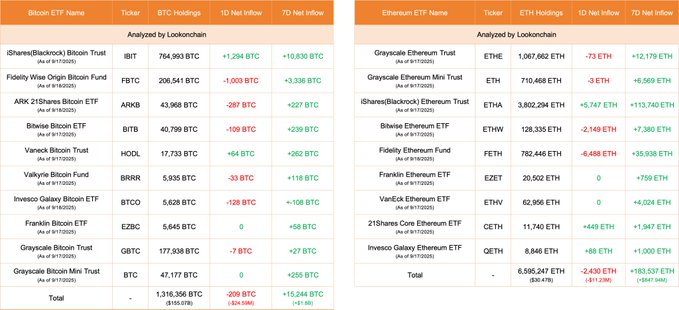- Bitcoin ETFs saw -209 BTC daily outflows but gained +15,244 BTC over the week.
- Ethereum ETFs added +183,537 ETH weekly, led by BlackRock’s ETHA with +113,740 ETH.
- Weekly trends showed stronger institutional preference for Ethereum over Bitcoin.
Bitcoin and Ethereum ETFs recorded contrasting movements with daily outflows counterbalanced by stronger weekly accumulation. Data compiled by Lookonchain revealed that while Bitcoin funds saw modest withdrawals during the session, Ethereum products outpaced them with substantial inflows across the week. The divergence pointed to different institutional allocation patterns as both markets continued to attract large-scale participation.
Sept 18 Update:
10 #Bitcoin ETFs
NetFlow: -209 $BTC(-$24.59M)🔴#Fidelity outflows 1,003 $BTC($118.13M) and currently holds 206,541 $BTC($24.33B).9 #Ethereum ETFs
NetFlow: -2,430 $ETH(-$11.23M)🔴#Fidelity outflows 6,488 $ETH($29.98M) and currently holds 782,446 $ETH($3.61B).… pic.twitter.com/Uw3OZimOHy— Lookonchain (@lookonchain) September 18, 2025
According to our previous report, holdings across all Bitcoin and Ethereum ETFs highlighted different investor behaviors in short-term trading. Collectively, Bitcoin ETFs held 1,316,356 BTC but registered a net daily outflow of -209 BTC, worth nearly 24.59 million dollars. Despite this decline, the seven-day trend showed inflows of +15,244 BTC, confirming that accumulation remained robust over the broader period.
Within Bitcoin products, the iShares Bitcoin Trust (IBIT) recorded the largest additions, with +1,294 BTC on the day and +10,830 BTC across the week, lifting its total holdings to 764,993 BTC. Fidelity’s Wise Origin Bitcoin Fund (FBTC) moved in the opposite direction, reporting outflows of -1,003 BTC during the session, though its weekly figure stayed positive at +10,336 BTC.
Smaller ETFs, including Valkyrie’s BRRR, VanEck’s HODL, and Franklin’s EZBC, added between +72 BTC and +118 BTC over the week. Grayscale’s spot funds also expanded, with daily increases of +87 BTC and +255 BTC.
Bitcoin and Ethereum ETFs Highlight Stronger Demand for Ethereum
In contrast, Ethereum ETFs posted stronger gains, both in total holdings and net inflows. The sector reported 6,595,247 ETH under management and weekly inflows of +183,537 ETH, despite recording daily outflows of -2,430 ETH, valued at 11.23 million dollars.
The iShares Ethereum Trust (ETHA) accounted for the largest movement, adding +113,740 ETH during the week, which increased its total to 3,802,294 ETH. Fidelity’s FETH also strengthened weekly flows with +35,938 ETH, even though it reported daily outflows of -6,488 ETH.

Source: Lookonchain
Grayscale’s ETHE added +12,179 ETH, bringing its holdings above 1,067,682 ETH. Bitwise’s ETHW advanced by +17,358 ETH, while Franklin’s EZET and VanEck’s CETH added +4,706 ETH and +4,042 ETH, respectively.
The sustained growth across Ethereum products signaled consistent institutional allocation, distinguishing them from the mixed outcomes seen in Bitcoin ETFs during the same timeframe.
Weekly Accumulation Outpaces Daily Movements
The data showed that short-term volatility did not alter the broader accumulation trend across both markets. Bitcoin funds maintained a positive weekly balance despite modest outflows on the day. Ethereum funds, however, captured stronger inflows overall, with ETHA driving the largest additions.
The latest figures reinforced the role of Bitcoin and Ethereum ETFs as key channels for institutional exposure, with weekly performance favoring Ethereum’s continued growth in managed holdings.
Stay informed with daily updates from Blockchain Magazine on Google News. Click here to follow us and mark as favorite: [Blockchain Magazine on Google News].
Disclaimer: Any post shared by a third-party agency are sponsored and Blockchain Magazine has no views on any such posts. The views and opinions expressed in this post are those of the clients and do not necessarily reflect the official policy or position of Blockchain Magazine. The information provided in this post is for informational purposes only and should not be considered as financial, investment, or professional advice. Blockchain Magazine does not endorse or promote any specific products, services, or companies mentioned in this posts. Readers are encouraged to conduct their own research and consult with a qualified professional before making any financial decisions.